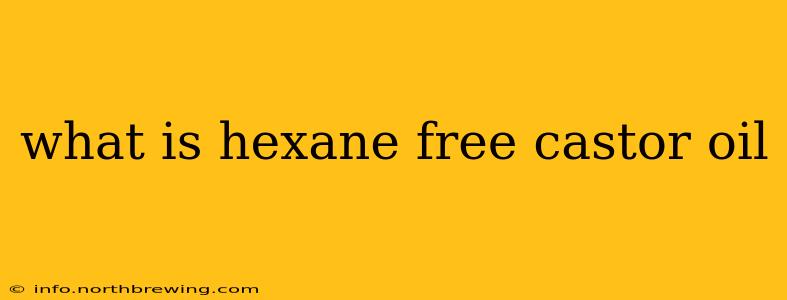Castor oil, derived from the seeds of the castor bean plant (Ricinus communis), is a versatile oil with numerous applications in cosmetics, pharmaceuticals, and industrial settings. However, the traditional method of extracting castor oil often involves the use of hexane, a hydrocarbon solvent. This raises concerns for some consumers due to hexane's potential health and environmental impacts. Hexane-free castor oil is simply castor oil that has been extracted using methods that avoid the use of hexane. This means the oil is purer and considered a more sustainable and ethically sourced product.
Why is Hexane Used in Castor Oil Extraction?
Hexane is a powerful solvent, making it highly effective at extracting oil from the castor beans. It's relatively inexpensive and readily available, making it a common choice in large-scale industrial production. The process involves soaking the beans in hexane, which dissolves the oil. The hexane is then evaporated, leaving behind the castor oil.
What are the Concerns About Hexane?
While hexane is widely used, concerns exist regarding its potential effects on both human health and the environment. Inhalation of hexane can lead to neurological effects, including dizziness, headaches, and in severe cases, peripheral neuropathy (nerve damage). Additionally, hexane is a volatile organic compound (VOC) and contributes to air pollution. The use of hexane raises questions about its residue in the final product and the overall sustainability of the process.
What are the Alternatives to Hexane Extraction?
Several alternative methods are available for extracting castor oil without using hexane. These methods generally involve using different solvents or mechanical processes:
- Supercritical CO2 Extraction: This uses carbon dioxide under high pressure and temperature to extract the oil. CO2 is considered environmentally friendly, as it readily returns to its gaseous state and leaves no harmful residues. This method produces high-quality oil but can be more expensive.
- Cold-Pressed Extraction: This mechanical method involves pressing the castor beans to extract the oil without the use of solvents. It's a more traditional and sustainable method but yields lower quantities of oil compared to solvent extraction.
- Other Solvent Extraction: Some manufacturers use other solvents, such as ethanol or isopropyl alcohol, which are considered less harmful than hexane. However, it's crucial to verify the purity and safety of the process used.
How Can I Identify Hexane-Free Castor Oil?
Look for products clearly labeled as "hexane-free" or "cold-pressed." Reputable brands often provide detailed information about their extraction methods on their websites or product labels. Checking for certifications, such as organic certifications, can also help ensure the product is produced using sustainable and safe practices.
Is Hexane-Free Castor Oil Better Than Regular Castor Oil?
While both hexane-free and hexane-extracted castor oil share similar chemical compositions, the hexane-free version is generally considered superior due to the absence of potential hexane residues. This makes it a safer and more environmentally friendly choice for consumers concerned about the potential health and environmental impacts of hexane. The purity and quality might also be higher, depending on the extraction method used.
What are the Benefits of Using Hexane-Free Castor Oil?
- Purity: Absence of hexane residues.
- Sustainability: Environmentally friendlier extraction methods.
- Health Safety: Reduces potential exposure to hexane.
- Potential Higher Quality: Depending on the extraction method, it may result in a higher quality oil.
Choosing hexane-free castor oil is a matter of personal preference and priorities. If you're concerned about the potential health and environmental effects of hexane, opting for hexane-free castor oil is a responsible and informed decision. Always check the product label and the manufacturer's information to make an informed choice.
